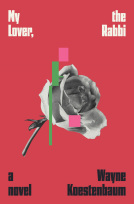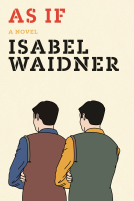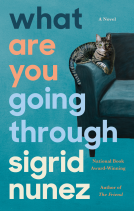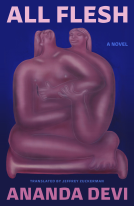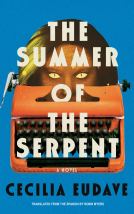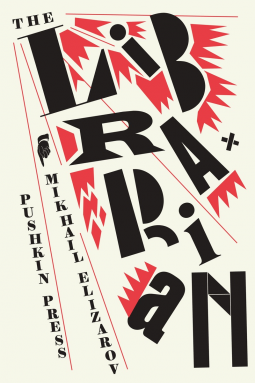
The Librarian
by Mikhail Elizarov
This title was previously available on NetGalley and is now archived.
Send NetGalley books directly to your Kindle or Kindle app
1
To read on a Kindle or Kindle app, please add kindle@netgalley.com as an approved email address to receive files in your Amazon account. Click here for step-by-step instructions.
2
Also find your Kindle email address within your Amazon account, and enter it here.
Pub Date Feb 10 2015 | Archive Date Dec 03 2014
Steerforth Press | Pushkin Press
Description
As the introduction to this book will tell you, the books by Gromov, obscure and long forgotten propaganda author of the Soviet era, have such an effect on their readers that they suddenly enjoy supernatural powers. Understandably, their readers need to keep accessing these books at all cost and gather into groups around book-bearers, or, as they're called, librarians. Alexei, until now a loser, comes to collect an uncle's inheritance and unexpectedly becomes a librarian. He tells his extraordinary, unbelievable story.
Advance Praise
"A truly bright author and an ingenious writer" Vladimir Sorokin, author of Ice Trilogy and Day of the Oprichnik
"The most radical of Russian Booker winners" Snob.ru
"Elizarov is an heir to the classic Russian writers" Prochtenie.ru
"Uncompromising, bizarre and desperate" Gazeta.ru
"How words can be more dangerous than machine-guns" Proza.ru
"A world of myths... and a requiem for a broken country" Questions of Literature
Available Editions
| EDITION | Other Format |
| ISBN | 9781782270270 |
| PRICE | $18.95 (USD) |
Average rating from 13 members
Featured Reviews
 Kathleen D, Reviewer
Kathleen D, Reviewer
I am mixed on this one. It is really out there for my usual tastes but the writing is intense. It is dizzying to be sure, and sometimes the reader gets lost in the happenings. I love that the books by Gromov are being fought over, because they are possibly 'magic' and the things that happen because of the writing... well... This novel spins in your head until you don't know where you are. Of the clans in the fight, well... "It should be said that to believe these women were weak was a serious error. In years and years of heavy labour their bodies had all accumulated immense muscular strength.They had simply become psychologically decrepit and forgotten that they once used to swing crowbars and axes untiringly at construction sites, lug sleepers and sections of rail on the railways or carry buckets and stretchers filled with immensely heavy cement." It's hard to tidily wrap up this strange Russian novel. The books effect on the characters is certainly a driving force, and strange though it is to imagine elderly women becoming wildly fierce, there was something, well... cool about it. Better than becoming dusty and forgotten with no life-force. Beyond strange, but this novel will have an audience.
 Annie S, Librarian
Annie S, Librarian
If you ask a reader about the experience of reading, he or she might say that a good book will fill up their mind to the point where they can shut out noise and distraction. They might also say that a well-written book will transport them to another world. This is all metaphor (though a certain kind of philosopher would argue with me). I imagine that something like this phenomena was the inspiration for Mikhail Elizarov's The Librarian. In this book, reading can convey special powers on readers of a particular author. Readers fight bloody battles for access to rare books and librarians declare war on each other. How could I not pick up this book?
The Librarian is not an easy book to start reading. The first chapters read like a textbook of alternate history of Soviet literature. We learn about Gromov and his terrible, terrible propagandistic novels about Soviet workers triumphing over adversity—in a censor-approved manner, of course. We are introduced to the curious emotional and physical properties bestowed on readers who fulfil two conditions: reading the book in one sitting from beginning to end and reading every single word without skimming. We are also told about the wars that broke out among the first readers to discover Gromov's books. Once all this backstory is out of the way, we finally meet our narrator, Alexei Vyazintsev.
Alexei enters the world of librarians and readers after the death of his uncle. He travels from the Ukraine to Russia in order to sell his relative's apartment, but strange things begin to happen as soon as he arrives. He witnesses two men who claimed to be interested in buying the apartment being assaulted in the street. He stands frozen on the spot, for Alexei is not a brave man. Then the attackers, who claim to be his protectors, set up a benign house arrest for Alexei and tell him he's the new librarian of their reading room.
Only a few days later, Alexei and his reading room are summoned to a meeting to settle a dispute between rooms. The dispute ends with a vicious confrontation. Guns are prohibited in this battles, but every other weapon or makeshift weapon is allowed. Alexei has no idea what he's gotten himself into. People are killing each other over books by an author he's never heard of before. Being a librarian is far from a quiet profession in Alexei's new universe.
As The Librarian speeds along, a conspiracy coalesces around Alexei and his readers. (It's a Russian novel. Of course there is a conspiracy.) The stakes ratchet up higher and higher as people die all around the new librarian. The ending blindsided me in a way that I'm still not sure I know how I feel about.
I was fascinated by the world Elizarov created in The Librarian, but I wonder at the level of Soviet nostalgia that pervades this book. Alexei learns to psyche himself up for battle by listening to old patriotic hymns. Gromov's novels all praise an idealized worker's state. Members of reading rooms all address each other as comrade. The actual horrors and paranoia of the Soviet state are almost completely omitted. Gulags are mentioned, but this doesn't off-set the pro-Soviet vibe. Of all the puzzling things in this puzzling book, the nostalgia puzzled me the most.
I received a free copy of this ebook from NetGalley, in exchange for an honest review. It will be released 10 February 2015.
 Juli R, Reviewer
Juli R, Reviewer
Sometimes a blurb is so fascinating that you simply have to pick up the book and devour it. Every reader has felt inspired and empowered by a book at some point, but what if books genuinely gave you superpowers? I guess you'll have to read The Librarian to figure out what would happen next.
Usually you have a pretty good idea what a book holds in store for you when you begin it. You have read the blurb, you have assessed the cover and maybe you already know the author as well. Starting The Librarian I thought I knew what I was up for but Elizarov proved me completely wrong. Starting off by introducing Gromov and some of Russia's librarians the reader feels as if they have been dropped into a completely unknown world which is shocking and fascinating. On the one hand this introduction is really interesting, on the other hand it requires some determination to stick with what sounds, at times, like a textbook. Not until the main narrator, Alexei, comes in does the reader find some solid footing in the narrative. In an interesting twist, the reader already knows more about this world of librarians and special books than Alexei himself, meaning that the relationship between Alexei and the reader is continuously interesting. When the relationship between a reader and his protagonist is developed in this way it means the reader can be independent of him or her, making up their own mind about what's happening in the narrative. This also means that the reader can choose to despise the protagonist, which is a big risk to take for the author.
Elizarov's novel works on a number of different levels. Not only do we explore a man's psyche, we also investigate the power of words and get a glimpse into the political and social landscape of Russia post-Stalin. Elizarov uses these different levels to craft a narrative that is incredibly Kafka-esque, while still somehow making sense. Added to this narrative is quite some violence, at times rather graphic, which is something that I wasn't quite expecting but seems logical when you think of the passion people show for "normal" books every single day. What makes this violence acceptable is that the essence of Elizarov's novel is utterly fascinating. Words have always had enormous power and those who say that a picture is worth a thousand words has to be thinking of a very special picture. The idea that this specific set of books has not only its own power but also the ability to give power to others is simple and yet intricate. Elizarov thinks of all the details; how does it work with copies of the book, how about public readings, etc. Words have been the cause of all major conflicts in the world, whether those conflicts have been over religious texts or inspired by rousing and passionate speeches.
Elizarov explains much while leaving enough unsaid for the novel to be mysterious until the last page. There are revelations and twists in almost every chapter and the richness with which Elizarov paints his world means none of these twists seem unfounded. Although I really enjoyed The Librarian I won't be rereading it for a while. Knowing the twists and turns and all the background information, it would be hard to go back to it and experience the same kind of surprise. There are definitely new details to be discovered though. Andrew Bromfield does a great job at translating Elizarov's prose, maintaining his tone throughout. Whether the novel is waxing lyrical over the Motherland or describing a massacre, Bromfield's translation keeps the reader engaged and passionate.
I really enjoyed Elizarov's The Librarian. It is unlike most of today's novels, sparing the readers none of the details while showering them with stunning image after stunning image. I would definitely recommend this to fans of Russian literature and those looking for a challenging and rewarding read.
 Kel M, Media/Journalist
Kel M, Media/Journalist
In translation
The Librarian by Mikhail Elizarov, translated by Andrew Bromfield (Pushkin Press, $18.95).
Song for an Approaching Storm by Peter Froeberg Idling, translated by Peter Graves (Pushkin Press, $14.95).
The Room: A Novel by Jonas Karlsson, translated by Neil Smith (Hogarth, $14).
Originally published in 2007, Mikhail Elizarov’s Russian Booker Prize-winning novel The Librarian is now available in translation from Pushkin Press.
It’s a fantastical work with political undertones, eventually settling upon the power of literature to transform us. Aleksei, the narrator, is his uncle’s heir; he’s inherited a Siberian apartment and leadership of what seems to be a very strange book club.
But really, he’s become a librarian—not your typical librarian, though. Aleksei has inherited the books of one Gromov, an author whose books may not have great literary value, but that confer upon their readers specific gifts—joy, rage, strength. There is also a missing book that grants meaning, and Aleksei’s future is tied up in it.
The Librarian benefits from the self-deprecating humor that Aleksei brings to the story, because the violent urges of Gromov’s readers as they seek to control their access to the books might otherwise make this a fable of inhumanity rather than an open-ended fable about human frailty.
Swedish novelist Peter Froeberg Idling sets Song for an Approaching Storm in Cambodia in 1955, where a young schoolteacher named Saloth Sar is leading a double life as he both works for a democratic nation and, undercover, foments Marxist revolution.
By the 1970s, he’ll be going by the name Pol Pot, and history remembers him as a genocidal maniac.
Idling weaves three narrators—Sar; a public official named Sam Sary; and Solary, a beauty queen once betrothed to Sar and now married to Sary—as he builds in readers a horrified understanding of how, exactly, the intellectual Sar became the dictator who built walls of bones. While Idling writes beautifully—and it’s hard to believe that this is a debut novel—he also doesn’t allow his readers to forget the horrors to come.
In The Room, Swedish actor and novelist Jonas Karlsson has written an absurd novel of the contemporary workplace, where everyone’s stress is doubled by the paranoia of possible job loss and inter-office politicking.
Bjorn seems to spend a lot of time at the office standing next to the wall and staring blankly into space, which unnerves his colleagues. However, he sees himself at work in a small, private room, a secret that no one else in the office seems to know anything about. As Bjorn’s creeped-out workmates seek ways to have him fired, he finds instead that the room offers him some tools with which to cope—and with which he can thwart his co-workers’ plans. The Room is both recognizable and hilarious, sure to strike a note of resonance with frustrated cubicle rats.
Readers who liked this book also liked:
Cecilia Eudave
General Fiction (Adult), Literary Fiction, Multicultural Interest

